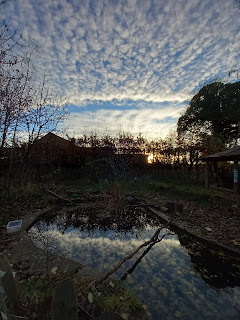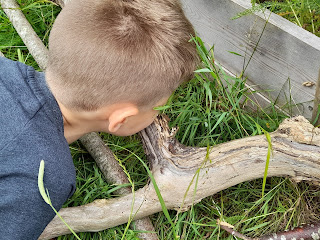Let's Explore at Home or on Site
Everyone's life is still upside down! School's have to react daily to ongoing changes, many Forest Schools are closed, parents & carers are both working from home and supporting remote learning, and it looks like nothing will change until March 8th...
For a lot of children who are stuck indoors play may also be restricted: available space, resources, noise levels, safety, etc can make playing inside a small affair, via a console, or board game, or building toys. This is still a very valuable use of their time, not only because it allows them the opportunity to choose and enjoy the task, but whatever play they do will be engaging their concentration, reasoning, and planning as well as hopefully being something they enjoy!
But getting outside elevates all that onto a much bigger scale, introduces fresh air, gives the chance to be more in control of their play, and gives space for lots of physical movement.
Den building is a Forest School given, with or without tarpaulins! Finding spaces in the woods that are naturally secluded, working with friends to find and adapt logs and sticks to create walls and furniture. Imagination, storytelling, teamwork, design, problem solving, trouble shooting, estimating, observation, cooperation, collaboration, conversation, and the physical exertion (to name but a few skills required) all work together in 'play'.
Devising games of Chase or Hide & Seek with new rules, with teams, with discussion, and being able to adapt it to incorporate growing numbers of participants, or a change in weather, or a new discovery involves high levels of communication and forethought, as well as an ability to evolve the development while playing. These games often involve an imaginative element, witches being chased, aliens being hunted, zombies often make an appearance! Frequently book characters are used.Re-enacting an old story, or creating their own narrative, having authorship over the story, pooling ideas, physically acting it out, working through ideas, emotions and memories, frustrations and fun. The Mud Kitchen frequently becomes the British Bake Off kitchen, or a cafe, or a mad scientists laboratory. Children from eyfs through to Year 6 love engaging in imaginative games. Taking turns and listening to each other, keeping it participatory and picking up where you left off last time, changing the direction of the story, including different people, inventing new characters. Or organising it for an audience, a real PLAY.
Engaging in the standard Forest School Activities like Bug Hunting, Bird Spotting, and Tree identification, learning about leaves and invertebrates, listening to birds, discovering fungi and lichen, exploring the undergrowth, climbing branches, digging in soil, and working with the materials around them, allows both a structure to their session and a familiarity with their surrounds. It gives the children ownership of their outdoor space, and the confidence to use it.
The freedom to CHOOSE what they want to know more about allows an independence rare in learning. The children can follow their own interests while being exposed to something new. Year 1 decided to play hide and seek with the toy birds, placing them in places they though each bird would nest, while their friends looked for them. The discussions on which birds had been found and which were still hidden, the use of correct names and great descriptions included so much learning that it would have been difficult to lesson plan it had I tried!
Whether in school or at home the only advice I can offer is to follow the children's lead, be available to help but don't be afraid to step back and simply watch them.
If they are engaged in something that interests them they may not need or want adult intervention! It can feel strange, as educators and parents we are used to 'keeping them occupied' but that doesn't always involve being part of the activity! As long as the child/ren are enjoying their game, as long as they are playing well together, stepping back to observe is a good thing to do. They will ask for input if they need it!
The Woodland Trust runs a great blog full of ideas for getting out of the house even in winter!
 Investing in, or borrowing some unusual items can help! In school or at home. Sourcing something like a Litterpicker can give a focus to the environment and can start discussion about colours, weather, wildlife, citizenship, community, and this week - history, we found a crisp packet from 2010 - from before the finder was born!
Investing in, or borrowing some unusual items can help! In school or at home. Sourcing something like a Litterpicker can give a focus to the environment and can start discussion about colours, weather, wildlife, citizenship, community, and this week - history, we found a crisp packet from 2010 - from before the finder was born!
The microscope is a more sophisticated bit of kit, but not massively expensive. It makes looking at anything close up a whole new experience! It attaches to your phone or ipad, allowing you to take snapshots of what you see when you look at leaf veins and soil, ice and snow, fingerprints and bugs etc...
I recommend shopping around for both/either, but here are links for the Litterpicker and the microscope to give a middling idea of price!
Being outdoors lessens the chance of virus transmission. The weather can be a challenge, but there is no such thing as the WRONG weather, just the wrong CLOTHES! Being wet, getting cold doesn't CAUSE illness, germs do that. Being wet and/or cold can make you more susceptible to germs, but only if you are not dressed for the climate! For children in school during lockdown, taking learning outside means time in the healthiest environment a school has. For those learning at home a walk, a visit to an open space, or even the garden, offers a break from the screen, from the pressure of learning solo, form the testing and twisting of family relationships.
In Forest School I use the word 'explore'. Not because I don't like the word 'play' but because I want the children to understand that they are independently investigating the outdoor areas, and what they find and choose to do is a process of discovery, of knowledge that they can share and use elsewhere.
"Are you ready to go and explore?" I ask when they are calmly seated and about to decide what they would like to do next. Children rarely ask me if they can 'go play', but impatience will lead them to ask "can we go and explore now?"
Play is a four letter word for inquiring, exploring, inventing, communicating, imagining, improvising, constructing, and accomplishing a self chosen, self motivated task. It is an informative, practical, valuable, and effective way to analyse, research, envision, improve, and understand the world.
It is a small word that encompasses so much, but is reduced to meaning 'time not working'.
Taking a break from a screen or a page to go outside and engage in play is never wasted time.
Outdoor Learning isn't always a subject with specific things to learn, it is the opportunity to hone all those skills above, find curiosity in different places, and to realise that learning something new is exciting.











Comments
Post a Comment